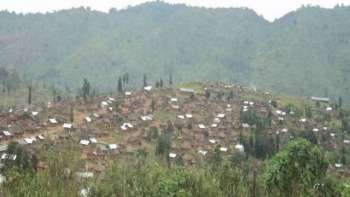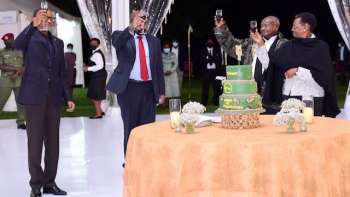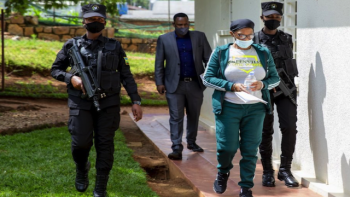Late Rwandan President General Juvénal Habyarimana and Burundian President Cyprien Ntaryamira were assassinated on the evening of 6 April 1994. Their assassination was the catalyst for unprecedented ethnically based massacres. At the and of the massacres, millions of Rwandans, from Hutu and Tutsi ethnic groups were killed. The assassination and the massacres that followed set off a regional humanitarian catastrophe whose consequences are felt even today, 22 years later. One can safely say that the assassination of Juvenal Habyarimana and Cyprien Ntaryamira has led to 7 million deaths, based on estimates from the NGOs, experts and, most importantly, the United Nations.
The question however is not about the numbers. The major question is why no one, so far has been held criminally and civilly accountable, except
unassuming scapegoats to accomodate collective political correctness of the international community.
The airplane carrying Rwandan president Juvénal Habyarimana and Burundian president Cyprien Ntaryamira was shot down as it prepared to land in Kigali, Rwanda. The two presidents were returning from signing peace accords to end a bloody civil war that had started 4 years earlier, when the Rwandan Patriotic Front (RPF), supported by current Ugandan President Yoweri Museveni and reinforced by Museveni's own republican guard, military intelligence and special force units invaded Rwanda on October 1, 1990. Although the responsibility for the attack is disputed, most theories, even reliable evidences point to the rebel Rwandan Patriotic Front (RPF).
Regardless of the cause of the assassination or who did it, questions have regularly been raised on why the United Nations and the World super powers have resisted so far to conduct thorough investigations, even when they did so for assassinations with much much less far reaching consequences.
As Rwandans commemorate the 22 years anniversary of the assassination, it may be reasonable to ask the same question: why didn't the United Nations conduct a formal investigation. Those who tried, including Carla Del Ponte, the former Prosecutor at the UN sponsored Internation Criminal Tribunal for Rwanda set up to try crimes committed in Rwanda during the fateful period, or the French Judge Brugiere, were punished to do so.
Investigations are needed, but so are long due compensations to the families of the victims, who on top of not getting justice for the assassinations, it appears, were never compensated for civil liabilities. In fact, even without criminal responsibility, the government of Rwanda and the Rwandan Patriotic Front that inherited the government bear the civilian liabilities and must compensate the families of the victims. Those who died were either, at the time of the assassination, using Rwandan government owned or managed property or working for the Rwandan government. That is why the Rwandan government that the Rwandan Patriotic Front inherited must compensate the families of the victims, whether Rwandan Patriotic Front is criminally responsible for the assassinations or not. The victims, whose families must be compensated are:
Juvénal Habyarimana, President of Rwanda
Cyprien Ntaryamira, President of Burundi
Bernard Ciza, Burundian Minister of Public Works
Cyriaque Simbizi, Burundian Minister of Communication
General Deogratias Nsabimana, Chief of Staff of the Rwandan Defence Forces
Colonel Elie Sagatwa, Member of the special secretariat of the Rwandan president, Chief of the Military Cabinet of the Rwandan president
Major Thaddée Bagaragaza, responsible for the "maison militaire" of the Rwandan president
Juvénal Renzaho, foreign affairs advisor to the Rwandan president
Emmanuel Akingeneye, personal physician to the Rwandan president
French aircraft crew of the Airplane managed by the Rwandan Government:
Jacky Héraud, pilot
Jean-Pierre Minoberry, copilot
Jean-Michel Perrine, flight engineer)


















